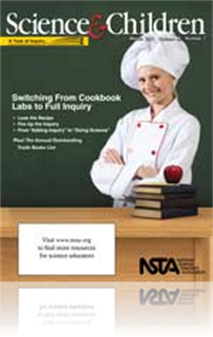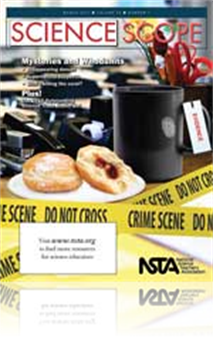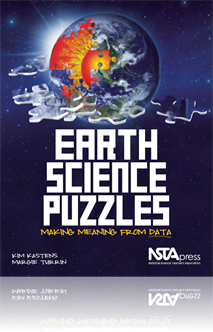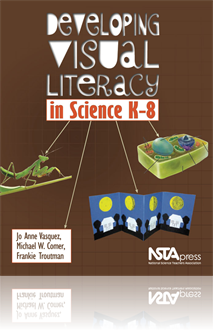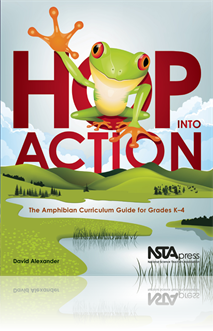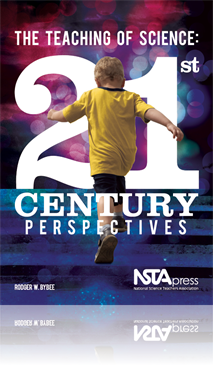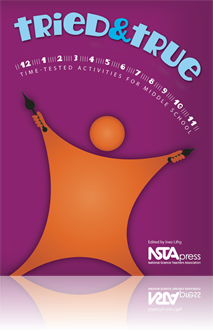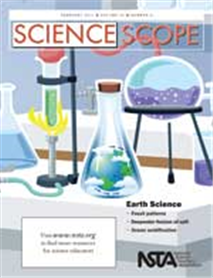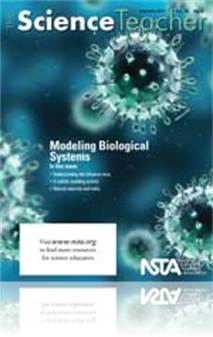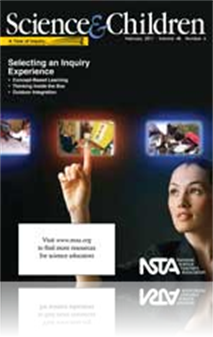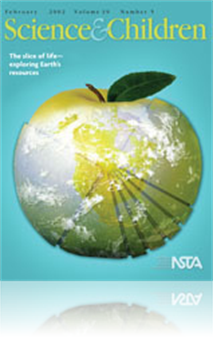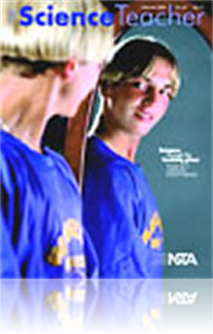All Resources
Journal Article
Lose the routine, tweak your "cookbook lab," and reach a level of open inquiry with these strategies used during a unit on heat....
Journal Article
Natural Resources: Get Out There
This column helps bring the outdoors into your curriculum. This month’s issue will start you thinking of summer opportunities. For students with a special interest in the outdoors, or those with limited access to nature, summer camp might be a life...
Journal Article
Tried and True: Spooky suspects
This column provides classic demonstrations and experiments with a new twist. This month’s issue presents an option for covering biology content while engaging students in an investigation that highlights the spirit of Halloween. Students are engag...
Journal Article
Methods and Strategies: Overcoming Difficulties
This column provides ideas and techniques to enhance your science teaching. In this month’s issue, bilingual second-grade students do scientific inquiry in pairs during a lesson on leaves. To help bilingual learners overcome language difficulties, ...
NSTA Press Book
More Brain-Powered Science: Teaching and Learning With Discrepant Events
• What can a chocolate chip cookie tell us about the Earth’s resources and the importance of environmental conservation? • How can a clear, colorless spray solution unveil a hidden message on a blank sign? ...
By Thomas O'Brien
eBook
Earth Science Puzzles: Making Meaning From Data (e-book)
Teachers of Earth and environmental sciences in grades 8–12 will welcome this activity book centered on six “data puzzles” that foster critical-thinking skills in students and support science and math standards....
eBook
Mastery Learning in the Science Classroom: Success for Every Student (e-book)
In these pages, Kelly Morgan presents a compelling case for implementing a mastery learning science classroom and then shows us how to do it. Using research-based student performance data, Morgan compiles impressive statistics that support her assert...
eBook
Developing Visual Literacy in Science, K–8 (e-book)
More than 50 percent of science lessons in today’s elementary textbooks use visual information to help demonstrate concepts. With Developing Visual Learning in Science, K–8, educators can help their students develop skills in interpreting photogr...
eBook
Hop Into Action: The Amphibian Curriculum Guide for Grades K–4 (e-book)
K–4 teachers, homeschoolers, camp leaders, and naturalists will find the standards-based lessons in this slim volume the perfect introduction to environmental science for young learners. Hop Into Action helps teach children about the joy of amphibi...
eBook
The Teaching of Science: 21st-Century Perspectives (e-book)
What should citizens know, value, and be able to do in preparation for life and work in the 21st century? In The Teaching of Science: 21st-Century Perspectives, renowned educator Rodger Bybee provides the perfect opportunity for science teachers, adm...
eBook
Tried and True: Time-Tested Activities for Middle School (e-book)
A compilation of popular “Tried and True” columns originally published in the award-winning journal Science Scope, this new book is filled with teachers’ best classroom activities—time-tested, tweaked, and engaging. These favorites are organi...
eBook
Predict, Observe, Explain: Activities Enhancing Scientific Understanding (e-book)
John Haysom and Michael Bowen provide middle and high school science teachers with more than 100 student activities to help the students develop their understanding of scientific concepts. The powerful Predict, Observe, Explain (POE) strategy, field-...
Journal Article
Tried and True: Earth’s reflection—Albedo
When viewing objects of different colors, you might notice that some appear brighter than others. This is because light is reflected differently from various surfaces, depending on their physical properties. The word albedo is used to describe how re...
Journal Article
Dinosaurs in the middle school classroom can be exciting. These extinct reptiles are both an exotic subject and familiar to our students. Because students are inherently interested, dinosaurs can serve as an effective portal for the integration of bi...
Journal Article
In their research, scientists generate, test, and modify scientific models. These models can be shared with others and demonstrate a scientist’s understanding of how the natural world works. Similarly, students can generate and modify models to gai...
Journal Article
Every Day Science Calendar: February 2011
This monthly feature contains facts and challenges for the science explorer. ...
Journal Article
It’s that time of year again, when avoiding the flu is on everyone’s mind. As we brace ourselves for possible flu outbreaks, the need to understand biological issues related to this virus becomes clear. Through modeling, the lesson presented in t...
Journal Article
Career of the Month: An Interview With Yoga Therapist J. J. Gormley-Etchells
In recent years, many individuals have looked to yoga to improve their well-being and many health care practitioners have encouraged it to complement healing. Recent studies demonstrate the beneficial effects of yoga for health (Chacko et al. 2005; C...
Journal Article
Formative Assessment Probes: Needs of Seeds
The “Needs of Seeds” formative assessment probe can be used to find out whether students recognize that seeds have needs both similar to and different from plants and other living organisms (Keeley, Eberle, and Tugel 2007). The probe reveals whet...
Journal Article
Teacher’s Toolkit: Processing the curriculum through quality questioning
In this inquiry-based project, student-generated questions became the basis for student-directed individual and group projects that provided practice with problem solving, critical thinking, and research skills while digging deeper into the Earth sci...
Journal Article
Guest Editorial: Pathways to Inquiry
Inquiry-based science can be a powerful approach to learning scientific concepts and keeping wonder and curiosity alive in the classroom. As stated by Hubert Dyasi, Professor Emeritus, City College New York, “Inquiry aligns with children’s natura...
Journal Article
The Early Years: Ongoing Inquiry
An in-depth science inquiry is an ongoing investigation in which children are introduced to materials through hands-on experiences and, with teacher guidance, begin to investigate a question that they can answer through their own actions, observation...
Journal Article
Science 2.0: “Flipping” Your Classroom
Aaron Sams and Jonathan Bergmann’s flipped classroom model allows them to provide direct instruction, but not during class. Students watch online lectures at night and teachers spend class time connecting individually with students—through hands-...
Journal Article
Science Shorts: Creature Connections
Most children want to help wildlife and save the planet. The following “Spot It! Scavenger Hunt” allows students to connect with nature by exploring the outdoor environment. Students are encouraged to explore their local environment and learn mor...
Journal Article
Inquiry Into the Heart of a Comet
Real science means wrangling with peers over real ideas. Wouldn’t it be thrilling to emulate a real life model of science in action in classrooms? How?...
Journal Article
Editor’s Corner: Model Biology
Models are at the core of the scientific enterprise. They help us make predictions, understand complex systems, generate new ideas, and visualize both the very large and the very small. The generation of models is the creative engine that drives scie...
Journal Article
Science Sampler: Fossil sharks—Learning from and about the past
In this article, the authors describe a series of science activities for middle school students that focuses on the study of fossil sharks through an examination of the morphological characteristics of their teeth by using models, drawings, and websi...
Journal Article
The Green Room: Student Sustainability Conferences
A day-long conference can be a perfect student-centered sustainability project. Not only is it a great way to get students together to discuss their ideas for sustainability in schools, but it also creates an alternative format that appeals to studen...
Journal Article
A major part of developing concept-based instruction is the use of an overarching idea to provide a conceptual lens through which students view the content of a particular subject. By using a conceptual lens to focus learning, students think at a muc...



